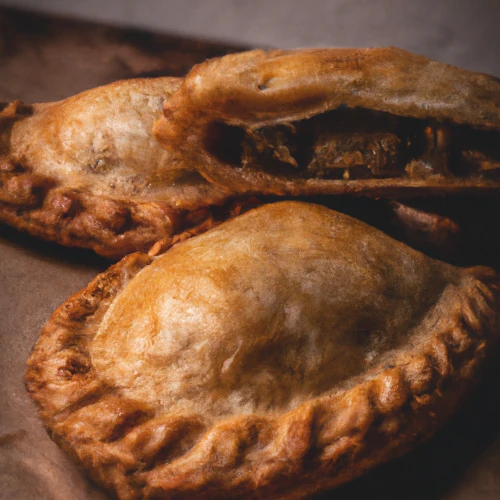Granny's Hearty Pasties

Welcome to Granny's kitchen, where we're serving up a taste of the Upper Peninsula with our Hearty Pasties. These savory pastries, brimming with a robust blend of meat and vegetables, are a nod to Michigan's rich Cornish mining heritage. Whether you're gathering around the family dinner table or venturing out for a picnic in the great outdoors, these pasties are a versatile delight. And with each bite, you'll discover the unique charm that has made them a beloved Michigan classic.
Like many traditional recipes, the pasty has its variations. Some folks like to add a bit of gravy, while others prefer theirs with a side of ketchup. No matter how you serve them, Granny's Hearty Pasties are sure to be a hit!

Ingredients
3 ½ cups flour 9 oz shortening 10 oz cold water 1 tbl + 1 tsp salt 3 ½ lb potatoes, peeled 1 ½ lb coarse ground pork 12 oz coarse ground beef 9 oz diced onions 8 oz diced carrots 7 oz diced rutabaga ¼ lb butter 1 tbl salt 1 tbl pepper
Method
- 1. In a large bowl, combine the flour, shortening, cold water, and salt. Mix until a dough forms.
- 2. In another bowl, combine the peeled potatoes, ground pork, ground beef, diced onions, diced carrots, diced rutabaga, butter, salt, and pepper. Mix until well combined.
- 3. Roll out the dough and cut into circles. Depending on the size of each pasty, it will yield approximately 10-12 pasties. Place a portion of the filling on one half of each circle. Fold the dough over the filling and crimp the edges to seal. Bake until golden brown.

Pasties: A Copper Mine Classic

Pasties, a hearty pastry filled with a savory mix of meat and vegetables, are a true Michigan classic with a rich cultural heritage. Their story begins in Cornwall, England, where they were a staple meal for tin miners and farm workers as far back as the 13th century. The pasty's robust and portable nature made it an ideal meal for these hardworking laborers, as it could be easily carried and eaten without cutlery, even in the depths of the mines.
The traditional Cornish pasty is filled with a simple yet satisfying combination of beef, potatoes, swede (rutabaga), and onions, all enclosed in a sturdy pastry crust crimped on one side. The distinctive crimping technique is a hallmark of the Cornish pasty and is said to have allowed miners to hold the pasty with their dirty hands without contaminating their meal.
From Cornwall to the Mines of the U.P.
In the mid-1800s, a wave of Cornish miners and their families emigrated to the Upper Peninsula (U.P.) of Michigan, lured by the booming copper mining industry. These hardy settlers brought with them not only their mining expertise but also their beloved culinary traditions, including the iconic pasty.
The pasty quickly became a staple in the U.P., its hearty nature perfectly suited to the demanding work of the local copper mines. The Michigan version of the dish evolved to include additional ingredients like carrots and rutabaga, creating a more flavorful and hearty meal that could sustain the miners through long shifts underground.
The pasty is just one example of the unique culinary traditions that have taken root in the Upper Peninsula, shaped by the region's history and the resilience of its people. Known as "Yoopers," the proud residents of the U.P. have developed a distinct food culture that reflects their rugged surroundings and the diverse influences of the immigrants who settled there. Yooper pasty history is a rich tapestry woven from the culinary traditions of Cornish miners, Finnish settlers, and other ethnic groups who made the U.P. their home. From dishes like pasties and kropsu (a savory pie) to the hearty stews and soups that warmed miners after long shifts, the cuisine of the U.P. is a testament to the ingenuity and resourcefulness of its inhabitants. Even today, Yoopers take great pride in preserving these culinary traditions, ensuring that the flavors and recipes of their ancestors live on for generations to come.
The Pastie Tradition - Passed Down Through Generations
Making pasties at home is a cherished tradition for many Cornish and Michigan families alike, a way to honor their heritage and connect with their roots. The process of preparing the dough and filling, carefully assembling the pasties, and baking them to golden perfection can be a fun and rewarding activity, especially when shared with loved ones.
In the U.P., pasty-making is more than just a culinary endeavor – it's a celebration of the region's rich mining history and the resilience of the Cornish immigrants who brought this beloved dish to their new home. The end result, a batch of piping hot, delicious pasties, is a treat that can be enjoyed by all, whether as a hearty meal or a portable snack for outdoor adventures.
So, the next time you're in the mood for a taste of Cornish and U.P. history, why not try your hand at making pasties? With their rich cultural heritage, delicious flavor, and connection to the region's mining legacy, they're sure to be a hit. Another example of how food connects us, even across oceans and centuries.